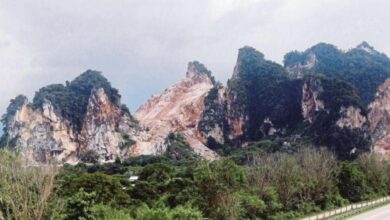Dark web a stark danger to Malaysian kids, teens

Dark web a stark danger to Malaysian kids, teens: experts
Many Malaysians do not realise it, but the internet comprises three layers and that what children search for on the Web is only the tip of the iceberg.
It is estimated that 90% or more is hidden in what is known as the “deep web”.
According to Datuk Seri Akhbar Satar, director of the Institute of Crime and Criminology at HELP University, it also contains a realm that poses immense danger to children and youth.
The former Transparency International Malaysia president explained that within the deep web lies the infamous “dark web”, intentionally hidden and inaccessible with standard browsers.
“Children are curious. It is only expected that their minds will go to these areas of the internet that are out of bounds and, therefore, seem more exciting,” he said.
“This puts them in danger, especially as the dark web is misused by criminals and Mafia-based organisations.
It is a marketplace used to buy and sell illegal drugs, pornography, firearms and ammunition, fake passports, as well as for child exploitation, child grooming, and even human trafficking.”
In an interview with The Vibes, he said the dark web can only be accessed by a special browser known as TOR, an abbreviation for “the onion routing”.
Akhbar described it as a heavily encrypted Web browser where the user can remain anonymous, which means predators cannot be identified.
According to Kaspersky.com, the term “dark web” refers to the hidden collective of internet sites only accessible by a specialised Web browser.
“It is used for keeping internet activity anonymous and private, which can be helpful in both legal and illegal applications,” says the cybersecurity and antivirus provider’s website. “While some use it to evade government censorship, it has also been known to be utilised for highly illegal activity.”
Akhbar has often been called on by parents for advice related to cyber issues faced by their teenagers.
He urged Malaysian parents to examine the dangers their children face on the internet and educate themselves on how to best protect and advise their young ones.
“Parents need to find out who their children’s Facebook friends are, who they chat with on a regular basis, and their WhatsApp groups,” he said.
“It is easy for teenagers between the ages of 14 and 17 to be drawn into traps set by these predators on the dark web,” he added.
Akhbar also said that just imposing academic standards on children and teenagers is not enough.
Parents need to foster in their wards an understanding of responsibility and ethics when using the internet, which he stressed should also be made part of the curriculum for schools.
“Parents need to be good role models for their children as it is leadership by example,” he said. “Rules that apply to children need to apply to the whole family. Parents should refrain from being bad examples to their children.”
Akhbar said that Malaysia had set up the National Cyber Security Agency in 2017 to serve as the national lead agency for cybersecurity matters.
He, however, questioned if the agency has established a protocol for children and cybercrimes.
Risks of a tech-saturated environment
Meanwhile, Assoc Prof Eugene Y.J. Tee, a research coordinator at HELP University’s Psychology Department, also stressed that it is imperative for parents to advise their children on the use of the internet and its many dangers.
He noted that children who have grown up in a tech-saturated environment – always having a device, always online, always on the internet – are, in many instances, more tech-savvy than their parents.
Many of them grow up with digital devices used for entertainment and socialising.
“But technology’s merits and benefits come with specific and unique risks,” he said.
“We’ve seen cases of children and adolescents engaging in problematic and compulsive smartphone usage, becoming victims of cyberbullying. Some of them end up suffering from poor mental health.
“Don’t get me wrong – I think the internet has countless benefits. But for younger children, there needs to be parental supervision and regulation of the use of digital devices and the internet content they can access.”
Tee cautioned that tech-savvy children may run the risk of exposing themselves to questionable and dangerous content online, and carrying out actions that not only harm themselves but others as well – including their siblings and friends.
“What is the psychology of children and teenagers who choose to surf and put themselves in danger? Is it plain curiosity?
“It’s probably both curiosity and the need for social acceptance or peer pressure.”
He said teenagers particularly feel the need to fit in and gain social recognition. This can be a strong driver for their compulsive and “irrational” actions, he said.
The influence of social media is also a factor in influencing such behaviours, he added. TV
Dark web a stark danger to Malaysian kids, teens
Baca Artikel Menarik :
- Bersatu Arau sudah mati, Ketua Bahagian letak jawatan, keluar parti
- Ada jurulatih suka melawak lucah, 7 tahun kemudian terlibat kes rogol – Pandelela
- Rumah ustaz pula jadi sasaran toyol
- Apa kaitan Emma Maembong dengan Addy Kana?
- Adegan rogol Raja Farah, netizen simpati kepadanya
- Najib, anak dibenar tangguh pembayaran tunggakan cukai
- Gangguan seksual pegawai JAIS, Sajat perlu buktikan
- SAl-Quran dibakar, polis siasat kejadian
- DAP beri amaran pada Norhizam, ‘Pengkalan Batu tetap milik kami’
- Cerita sampah Vida, Iqbal, mereka yang untung, kita dapat apa?
- Ibu gajah pijak mati buaya hendap anak
Layari Laman Facebook MYKMU




